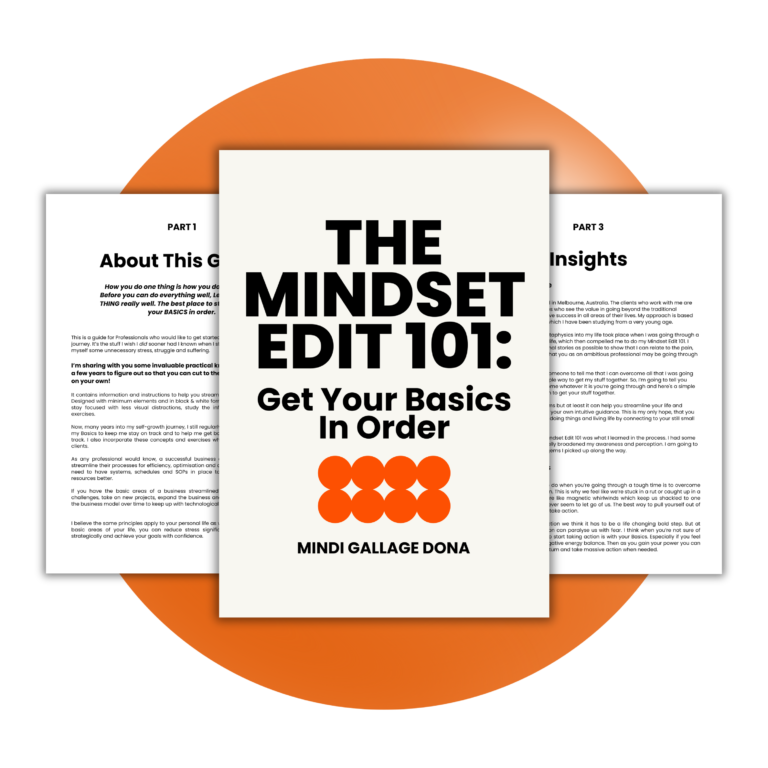This article is part of a mini series where I share with you some of my best tips to help you get through a tough time. Instead of giving a long list of many tips, my aim is to offer 3 tips at a time, breaking down each. So that you get a basic understanding as to why these tips are effective and why you should add them to your daily practice. In an ideal world we all would be proactive with our mental health and putting processes into place to mitigate any negative impact from life’s many challenges. Or better still working with a therapist, coach or a consultant to get specialised and customised assistance.
As I am aware that we are all at different stages of having access to resources and even personal capacity, my hope is that my mindset coaching tips can help you in some way to relieve you of stress. I find that there is so much great information out there but when you are going through a very stressful time you can get overwhelmed with where to start. So with this series of articles, you can pick whichever tip or tips that resonate with you and put them into practice.
You can read part 1 of the mini series here. Here are 3 more tips to help you get through a tough time.
In Each Segment I Focus On:
- Each Of The 3 Tips
- The Why
- The How
1. Engage In A Hobby
I mostly work with clients on managing stress, relieving anxiety and recovering from burn-out. An activity that I always encourage my clients to take part in is engaging in a hobby. My suggestion to them is to carve out regular times where they immerse themselves in doing something they love to do, no matter how weird, silly, childish or irrelevant it is to their professional work. It is always interesting to see how their expressions and mood change when recalling favourite pastimes.
I had to help an ex-partner who was going through a tough time and I was also going through a very challenging time at work at the same time. It felt like I was burning the candle on both ends and was so exhausted every day of the week. During this time while watching many inspirational and random videos on YouTube, I came across one of my favourite hobbies, stationery. Collecting different stationery and also using them for planning and organisation has always been one of my creative outlets.
I remember one particular evening when I got home from work, I just sat down at my dining table with my brand new Filofax planner. The next thing I knew was, I had spent two hours without the usual regurgitating of my worries with friends over the phone but instead happily getting lost in my magical creative world. I felt unusually energised afterwards. When I shared my experience with a friend she said gardening for two hours after work helped her too, to get through a particularly challenging time at work.
When going through a challenging period, most devote all their waking hours to the problem, thinking that they would be wasting time and energy if they engage in something fun. But engaging in a hobby can be very useful, giving your nervous system a break from constant living in survival mode. It gives your body a chance to rest and repair, stimulate your creative faculties of the mind and help you to look at your situation from a different perspective.
The How
- Pick one hobby that really sparks joy in you. The more unrelated and different they are to your profession the better.
- Be mindful of your rational mind tricking you to be productive and select one of your responsibilities as a hobby. Such as justifying doing chores as a hobby or telling yourself that your professional work is a creative outlet too.
- While everything we do in life is creative the whole idea here is to get you to do something which doesn’t carry the weight of responsibility, productivity and urgency. Just doing something fun for the sake of it.
- You do not have to spend a lot of money on buying necessary tools. Start with what you have already. If you love to sketch, all you really need is some paper and a pencil. Start small and let the inspiration carry you to the next level.
- Carve out regular time to practise. Twice a week for 30 minutes a day is a good amount of time to start with. I suggest that you have one session during the week to break up the week without hanging for the weekend.
- If it feels safe to you, join an online or in-person community where you can share your love for the hobby. This gives another healthy break from your usual survival-mode routine. I have met some wonderful humans from all over the world since I resumed my love for stationery.
- Journal your thoughts and moods regularly to see how taking up a hobby is affecting your mindset.
Taking up a hobby is one of the most helpful activities you can do to boost your mood and broaden your perspective. Human mind craves and thrives on novelty and taking up a creative practice is a healthy way to stimulate ourselves over spending many hours on mindless scrolling on social media.
2. Make A List Of All Your Achievements
A common behaviour which most of you can relate to when going through a tough time is this tendency to evaluate your entire future based on your current challenge. Take an example of Sam* who left his job in a highly dysfunctional work environment. Though qualified with academic and professional experience, he is considering taking a less challenging role with a significant pay cut and willing to forgo all his professional and personal goals.
He thinks that everyone in the corporate world is out to get talented people like him and there is no way out. While there is nothing wrong with someone going for a lower salary and taking a less challenging role to pursue a different lifestyle, Sam is making these decisions from a victim mentality, incorrectly perceiving his future to be all doom and gloom. A helpful exercise to change your perspective is to write down a list of your achievements up to date.
Once I was very unsure about taking on a professional opportunity that was presented to me. Out of nowhere came to my mind the time I started lifting heavy weights at the gym. I was so self-conscious then to be working out among professional body-builders. But gradually I went up to pushing 200kg on a leg press and looked forward to my time at the gym. I told myself, “I have already done something which seemed impossible and succeeded too, so I can definitely do the same again.”
Recalling my past win helped me take up the new opportunity and do so well at it too. It doesn’t matter if the accomplishment is in the same field or not. In my case a personal accomplishment helped me proceed with a professional challenge. Writing a list of all your professional and personal accomplishments is like a meta version of the daily gratitude list. When doubt and fear hits you at a challenging time, instead of writing off your entire life as a failure, recalling any of your past achievements can positively reinforce your mindset.
The How
- Find some quiet time with your journal or open a spreadsheet. You might need about 30 minutes to an hour. Once you start on this exercise you won’t be able to stop yourself.
- Write down all your personal and professional achievements. Write the date or the month and year next to each achievement or in a separate column if using a spreadsheet. You can also add another column to label the events as personal and professional. With a spreadsheet you can easily sort the events by the date to get an idea of the timeline. Then you can even re-write in your journal in the correct chronological order.
- Recall as many achievements as possible; Graduations, getting your driver’s licence, first job, travels, promotions, creative projects, voluntary work, first time you perfected baking potatoes, help offered to friends and family, birth of your human babies, the day you got your fur babies and everything else that gives you a sense of accomplishment.
- More will come to you later. But once you have listed about 20 accomplishments, read each one and pause for a moment to appreciate your courage. Take a moment to appreciate how far you have come.
- I have my list of achievements right next to my yearly goals in my planner. Read this list everyday and remind yourself what a capable, worthy, special and courageous human being you are.
Whenever you feel low about the challenge you are facing, read or recall all your accomplishments. Just like how you got through all your past challenges you can also get through the current.
3. Spend Time In Nature
I find it fascinating how distant we are from nature. As someone who lives in an urban area, I need a reminder to get out of my apartment and walk barefoot on grass! I came to realise this distance more during the lockdowns as I found myself exploring all the parks, reserves and trails in my neighbourhood. Walking in nature and spending some alone time sitting on a tree trunk was the ultimate Zen experience I never knew I needed.
It was only a few weeks ago that I learned from a friend that Germans have a word specifically for this experience called Waldbaden meaning forest bathing. Then I came across a post on Instagram about Japanese having their own term for forest bathing called Shinrin-Yoku. As I looked more into it, the Japanese practice was introduced by their minister of agriculture Tomohide Akiyama in the 1980s, and later inspired the Germans.
Spiritual teachers especially those who practise Yoga, Tai Chi and other eastern philosophies teach that by walking barefoot in nature can recharge our lifeforce ( a.k.a prana, chi ) energy with earth’s geomagnetic energy. I also know many personal development advocates who swear by this practice. I have been recommending spending time in nature and walking barefoot on grass to my clients for some time too.
Nature has a healing effect on our psyche. The time spent in silence is a healthy break from our busy life, especially during a time of significant emotional distress.
The How
- It is always a good idea to find a park or a reserve where you feel safe, and a time when there’s sufficient daylight, especially if you haven’t spent time alone outdoors in a long time.
- Try not to listen to music or podcasts and talk on the phone during this time. Silence is the keyword.
- Start off with sitting down in silence for 5 minutes. You can close your eyes for a moment and listen to the sounds of the birds, the wind, rustling of leaves and water if there is a fountain or a creak nearby. Try to soak up the sounds of nature around you.
- Or else you can silently watch the space around you. You can even watch the clouds or watch the flow of water. Try not to force yourself into feeling peaceful. But just observe the nature around you. And don’t be shy to hug a tree if you feel like it.
- Sadly with some parks and reserves closer to urban areas, you have to be careful when walking barefoot and look out for broken glass and sharp objects. Find a clear patch where you can remove your shoes and walk around for another 5 minutes. I like to stretch or do a couple of Yoga poses while I’m barefoot.
- As you get used to spending time alone in nature, you can gradually increase the time you spend and even do a little meditation while you are outdoors.
- Try to spend at least 3 days a week out in nature.
I hope these tips will help you overcome whatever it is that you are going through. Be kind to yourself and take a soothing approach. As I always say, start with the basics and keep things as simple as possible. Stay tuned for more tips on this mini series. I would love to hear your thoughts.
*The names have been changed to protect the identity of the individuals involved.


